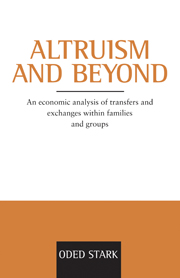Book contents
- Frontmatter
- Contents
- Preface
- Introduction
- 1 Altruism, transfers, and wellbeing
- 2 The timing of intergenerational transfers: an implication
- 3 An exchange implication of transfers: the demonstration effect
- 4 Transfers by migrants: a strategic motive for remittances
- 5 Exchange with recognition costs: an explanation of migrants' performance
- 6 Intrafamilial transfers and exchanges: forming and sustaining altruism
- Index
3 - An exchange implication of transfers: the demonstration effect
Published online by Cambridge University Press: 23 September 2009
- Frontmatter
- Contents
- Preface
- Introduction
- 1 Altruism, transfers, and wellbeing
- 2 The timing of intergenerational transfers: an implication
- 3 An exchange implication of transfers: the demonstration effect
- 4 Transfers by migrants: a strategic motive for remittances
- 5 Exchange with recognition costs: an explanation of migrants' performance
- 6 Intrafamilial transfers and exchanges: forming and sustaining altruism
- Index
Summary
Introduction
Recent evidence indicates that private intergenerational transfers of income, wealth, and in-kind services are motivated, at least in part, by exchange considerations. For example, parents attach strings to money given to their children and transfers are made with the expectation of future repayment. Evidence supporting the idea that intergenerational transfers in the family are motivated partly by self-interest is contained in papers by Lucas and Stark (1985), Bernheim, Shleifer and Summers (1985), and Cox (1987).
Despite evidence supporting the existence of an exchange element in private transfers, we do not know much about the mechanisms that sustain and enforce these two-way transactions. Enforcement of intergenerational exchanges has hardly been explored in economics. One possibility is that enforcement comes from explicit incentives: economic punishments or rewards. Bernheim, Shleifer and Summers offer evidence that the threat of disinheritance induces children to provide attention to their parents. But monetary mechanisms may not always work. Suppose a parent lends to his child, expecting repayment in old age. If anticipated future bequests motivate behavior only mildly, or not at all, the parent may have little economic leverage for enforcing an implicit long-term contractual arrangement.
- Type
- Chapter
- Information
- Altruism and BeyondAn Economic Analysis of Transfers and Exchanges within Families and Groups, pp. 49 - 88Publisher: Cambridge University PressPrint publication year: 1995

